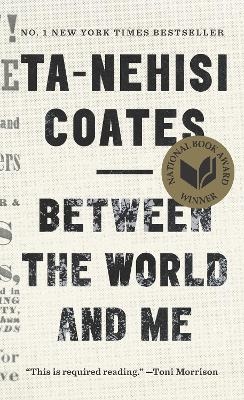
Between the World and Me
One World Books (Verlag)
978-0-525-51030-7 (ISBN)
#1 NEW YORK TIMES BESTSELLER - NATIONAL BOOK AWARD WINNER - NAMED ONE OF TIME'S TEN BEST NONFICTION BOOKS OF THE DECADE - PULITZER PRIZE FINALIST - NATIONAL BOOK CRITICS CIRCLE AWARD FINALIST
Hailed by Toni Morrison as "required reading," a bold and personal literary exploration of America's racial history by "the most important essayist in a generation and a writer who changed the national political conversation about race" (Rolling Stone)
NAMED ONE OF THE MOST INFLUENTIAL BOOKS OF THE DECADE BY CNN - NAMED ONE OF PASTE'S BEST MEMOIRS OF THE DECADE - NAMED ONE OF THE TEN BEST BOOKS OF THE YEAR BY The New York Times Book Review - O: The Oprah Magazine - The Washington Post - People - Entertainment Weekly - Vogue - Los Angeles Times - San Francisco Chronicle - Chicago Tribune - New York - Newsday - Library Journal - Publishers Weekly
In a profound work that pivots from the biggest questions about American history and ideals to the most intimate concerns of a father for his son, Ta-Nehisi Coates offers a powerful new framework for understanding our nation's history and current crisis. Americans have built an empire on the idea of "race," a falsehood that damages us all but falls most heavily on the bodies of black women and men-bodies exploited through slavery and segregation, and, today, threatened, locked up, and murdered out of all proportion. What is it like to inhabit a black body and find a way to live within it? And how can we all honestly reckon with this fraught history and free ourselves from its burden?
Between the World and Me is Ta-Nehisi Coates's attempt to answer these questions in a letter to his adolescent son. Coates shares with his son-and readers-the story of his awakening to the truth about his place in the world through a series of revelatory experiences, from Howard University to Civil War battlefields, from the South Side of Chicago to Paris, from his childhood home to the living rooms of mothers whose children's lives were taken as American plunder. Beautifully woven from personal narrative, reimagined history, and fresh, emotionally charged reportage, Between the World and Me clearly illuminates the past, bracingly confronts our present, and offers a transcendent vision for a way forward. Wenn in den USA schwarze Teenager von Polizisten ermordet werden, ist das nur ein Problem von individueller Verfehlung? Nein, denn rassistische Gewalt ist fest eingewebt in die amerikanische Identität - sie ist das, worauf das Land gebaut ist. Afroamerikaner besorgten als Sklaven seinen Reichtum und sterben als freie Bürger auf seinen Straßen. In seinem schmerzhaften, leidenschaftlichen Manifest verdichtet Ta-Nehisi Coates amerikanische und persönliche Geschichte zu einem Appell an sein Land, sich endlich seiner Vergangenheit zu stellen. Sein Buch wurde in den USA zum Nr.-1-Bestseller und ist schon jetzt ein Klassiker, auf den sich zukünftig alle Debatten um Rassismus beziehen werden.
Ta-Nehisi Coates is a national correspondent for The Atlantic. His book Between the World and Me won the National Book Award in 2015. Coates is the recipient of a MacArthur Fellowship. He lives in New York City with his wife and son.
I. . . . we sprawl in gray chains in a place full of winters when what we want is the sun Amira Baraka, "Ka Ba" Son, Last Sunday the host of a popular news show asked me what it meant to lose my body. The host was broadcasting from Washington, D.C., and I was seated in a remote studio on the far west side of Manhattan. A satellite closed the miles between us, but no machinery could close the gap between her world and the world for which I had been summoned to speak. When the host asked me about my body, her face faded from the screen, and was replaced by a scroll of words, written by me earlier that week. The host read these words for the audience, and when she finished she turned to the subject of my body, although she did not mention it specifically. But by now I am accustomed to intelligent people asking about the condition of my body without realizing the nature of their request. Specifically, the host wished to know why I felt that white America's progress, or rather the progress of those Americans who believe that they are white, was built on looting and violence. Hearing this, I felt an old and indistinct sadness well up in me. The answer to this question is the record of the believers themselves. The answer is American history. There is nothing extreme in this statement. Americans deify democracy in a way that allows for a dim awareness that they have, from time to time, stood in defiance of their God. But democracy is a forgiving God and America's heresies-torture, theft, enslavement-are so common among individuals and nations that none can declare themselves immune. In fact, Americans, in a real sense, have never betrayed their God. When Abraham Lincoln declared, in 1863, that the battle of Gettysburg must ensure "that government of the people, by the people, for the people, shall not perish from the earth," he was not merely being aspirational; at the onset of the Civil War, the United States of America had one of the highest rates of suffrage in the world. The question is not whether Lincoln truly meant "government of the people" but what our country has, throughout its history, taken the political term "people" to actually mean. In 1863 it did not mean your mother or your grandmother, and it did not mean you and me. Thus America's problem is not its betrayal of "government of the people," but the means by which "the people" acquired their names. This leads us to another equally important ideal, one that Americans implicitly accept but to which they make no conscious claim. Americans believe in the reality of "race" as a defined, indubitable feature of the natural world. Racism-the need to ascribe bone-deep features to people and then humiliate, reduce, and destroy them-inevitably follows from this inalterable condition. In this way, racism is rendered as the innocent daughter of Mother Nature, and one is left to deplore the Middle Passage or the Trail of Tears the way one deplores an earthquake, a tornado, or any other phenomenon that can be cast as beyond the handiwork of men. But race is the child of racism, not the father. And the process of naming "the people" has never been a matter of genealogy and physiognomy so much as one of hierarchy. Difference in hue and hair is old. But the belief in the preeminence of hue and hair, the notion that these factors can correctly organize a society and that they signify deeper attributes, which are indelible-this is the new idea at the heart of this new people who have been brought up hopelessly, tragically, deceitfully, to believe that they are white. These new people are, like us, a modern invention. But unlike us, their new name has no real meaning divorced from the machinery of criminal power. The new people were something else before they were white-Catholic, Corsican, Welsh, Mennonite, Jewish-and if all our national hopes have any fulfillment, then they will have to be something else again. Perhaps they
| Erscheinungsdatum | 22.08.2017 |
|---|---|
| Zusatzinfo | BLACK&WHITE PHOTOS THROUGHOUT |
| Verlagsort | New York |
| Sprache | englisch |
| Maße | 107 x 173 mm |
| Gewicht | 102 g |
| Themenwelt | Literatur ► Biografien / Erfahrungsberichte |
| Sachbuch/Ratgeber ► Geschichte / Politik ► Politik / Gesellschaft | |
| Sozialwissenschaften ► Politik / Verwaltung ► Allgemeines / Lexika | |
| Sozialwissenschaften ► Soziologie ► Allgemeines / Lexika | |
| Schlagworte | African American • African american authors • African American History • African Americans • American History • American social history • autobiographies • Autobiography • Biography • Black lives matter • books for dad • Civil War • Current Affairs • Discrimination • Diversity • fathers and sons • History • History books • history of race in America • history of slavery • howard university • Journalism • Memoir • Memoirs • National Book Award • national book award finalists • national book award winner • national book award winners • Police brutality • political books • Politics • post-civil war history • Race • Race in America • Race relations • race relations in America • Racism • Rassenkonflikt • Rassismus • Sklaverei • Social Justice • USA, Geschichte; Sozial-/Wirtschafts-Geschichte |
| ISBN-10 | 0-525-51030-3 / 0525510303 |
| ISBN-13 | 978-0-525-51030-7 / 9780525510307 |
| Zustand | Neuware |
| Haben Sie eine Frage zum Produkt? |
aus dem Bereich


